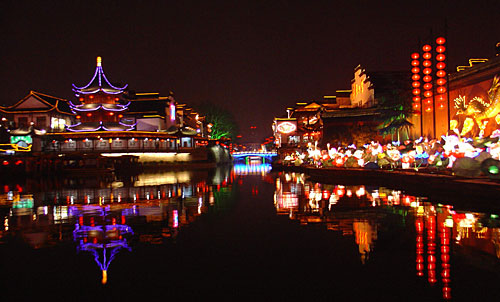|
Management difficulties
Although the Nanjing Government had introduced a series of river treatment projects since 1949, pollution control was not taken into consideration until 1980, since their attentions were focused on dealing with floods and ship transportation.
 |
|
Qinhuai River at night (EOYOYO.COM) |
After 1980, pollution control was promoted as the dominant project on the Qinhuai River. The goals were to turn standing water into flowing water, change polluted water into clean water, prevent flooding after storms, and help ships travel the river smoothly. The key to turning standing water into flowing water was to establish a water circulation system within the Yangtze River region, Xuanwu Lake and the Inner Qinhuai River.
Since the late 1990s, pollution control has been in the spotlight from media coverage and social discussion. On January 8, 2002, more than 10 academicians and professors from Nanjing University submitted proposals to the local government concerning the Qinhuai River. In August 2003, 30 volunteers spent eight days walking along the Qinhuai River, doing on-site ecological research as well as promoting environmental protection.
Market-oriented public programs
The work paid off through the years. The Nanjing Municipal Government was awarded the Habitat Scroll of Honour Special Citation on November 11, 2008 by UN-HABITAT, for its bold, distinct, exemplary and comprehensive redevelopment, revitalization and improvement along the Qinhuai River.
Anna Tibaijuka, UN-HABITAT Executive Director of the United Nations Environment Program, visited the Qinhuai River in person in 2008 and noted that the environmental improvements there "set an example for the successful application of government funds and public resources to environmental protection."
Lu Pinggui, director of the Nanjing city construction committee, said that public programs such as the water clearance project should be funded primarily by the government, but the government can't afford the whole reconstruction of the Qinhuai River. Therefore, by raising capital, reforming investment and promoting the optimum allocation of urban resources, the government explored efficient ways of operating market-oriented public programs.
Since 2002, funds for rehabilitating the Qinhuai River governance have been collected by raising capital. The clearance project is being conducted through the system of holding the legal person responsible for projects, which means the legal person is responsible for the whole process construction process. The Qinhuai River Construction Development Corporation Ltd. is responsible for raising capital as well as the construction, management and operation of the Qinhuai River clearance project, which greatly reduces the burden on government and lowers construction costs; it also increases the efficiency of construction. Meanwhile, the responsible corporation also benefits from preferential government policies, which ensures the quality of construction.
"Ten years ago, I would make fun of visitors who intended to reach the Confucius Temple by taking a cruise on the Qinhuai River, because the river was virtually a stink ditch at that time," Chen Hua said. "But today, I would recommend that they take a painted boat on the river and see the scenery in person. I'm sure that the Qinhuai River, together with the city of Nanjing, is getting better and better." | 
